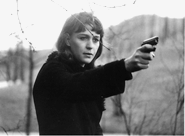In his early short essay film, Brutality in Stone, Alexander Kluge channels the contemplative spirit of Alain Resnais’ Night and Fog and Statues Also Die (co-authored by Chris Marker) to convey the idea of architectural memories, the traces of memory that subconsciously remain within the de-contextualized images of derelict structures and abandoned ruins, in this case, the decimated Nazi Party Rally Grounds in (then) present day Nuremberg. For Kluge, this evidence of a haunted, inerasable palimpsest of tragic, forgotten history is an unspoken reality that continues to shape Germany’s unreconciled, postwar collective consciousness – a nation eager to put its turbulent and ignominious past behind and re-emerge internationally as an enlightened and formidable economic world power (enabled by an economic miracle that would lead to the implementation of a liberal guest worker program during the 1960-70s). It is within the resurfacing of these abandoned, yet apparent traces of a scarred history – this persistence of suppressed memory – that Kluge also frames his first feature film, Yesterday Girl, an acerbic, deliriously fractured, incisive, and darkly comic satire on a young German woman (and archetypal embodiment of the postwar generation), Anita G.’s (Alexandra Kluge) search for happiness, liberation, and independence in the illusive wake of a transformative national recovery (a parallel history of postwar reformation not unlike Japan’s recovery). Indeed, the film’s tersely written preface, “What separates us from yesterday is not a rift but a change in position” reinforces this sense of subconscious, recursive inevitability, as the heroine, the titular Anita G, is introduced through incisive, cross cut images: initially reading a piece of paper in subtly varying intonation, then subsequently, from a high angle-shot title sequence as she repeatedly assesses her vantage point before changing seats at a hotel bar lounge. From the juxtaposition of these fractured opening images, Kluge establishes the idea of postwar collective memory as an empty shell game that has been essentially formed from the simple, but implicitly deliberated modulation, displacement, and reconstitution of latent, prevailing cultural mores.
This sense of an ingrained, un-rehabilitated, and perhaps even defiant national psyche is also reinforced in Anita’s appearance in court before a judge over a theft charge stemming from a colleague’s appropriated cardigan sweater. Reviewing Anna’s background as a German Jew from Leipzig, now in (the former) East Germany whose family business was confiscated by the Third Reich, then reinstated after the war, the judge is eager to exonerate the possibility that the “certain incidents of 1943-44” had contributed to Anita G.’s current charge – an association that she, herself, never implied – attempting instead to trivialize her relocation to West Germany as a simple search for opportunity that, like any other outsider (despite being born in a unified Germany before the war), is an attempt to exploit the country’s bourgeoning economy. Challenging her sense of guilt for the offense by her curious behavior in not hiding the cardigan – an inaction that Anita admits stemmed from confusion over “prior events” that the judge, once again, is quick to erroneously suggest that she is attempting to evoke the tragedy of the Holocaust in order to gain sympathy from the court – the inquisition itself reveals the underlying hypocrisy of German society after the war, where people who served in positions of power during the Third Reich (obtained through party loyalty) were often restored to their bureaucratic appointments. This contradictory behavior that is, at once, an all-too-ready admission of (factually verified) historical culpability and a trivialization of the consequences of its legacy reflects a culturally pervasive attitude, a tenuous co-existence between half-hearted acknowledgement and adamant denial that is encapsulated by the judge’s curt dismissal in continuing the line of inquiry that raises the specter of the human tragedy (one that he, himself, has introduced out of apparent habit): a pre-emptive declaration of its particular – and implicitly broader – irrelevance towards the resurgence of an inclusive, tolerant, and transformed “New Germany”. Ironically, it is a metamorphosis that, nevertheless, perpetuates a climate of exclusion (East versus West), moral imprisonment (the evangelical probationary officer attempts to convert her to Christianity), and dispossession (the landlady’s decision to evict her from the boarding house by impounding her suitcase). Inevitably, perhaps the key to Kluge’s fragmented, yet lucid and penetrating social interrogation is revealed in a university professor’s sterile and philosophically dense lecture on the relativity of the Greek concept of aischron and the opposing corollary ideas that the greater shame resides either for the one who commits the transgression, or the one who suffers from it – a delusive posture of righteousness that re-invents collective history through the perspective of defiant transgressors as the greater victims of their own willful, moral complicity.
© Acquarello 2007. All rights reserved.
